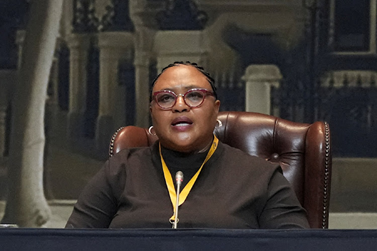For the first time in South Africa’s history, in an unprecedented move by the government of President Cyril Ramaphosa not seen since the dawn of Democracy the Budget speech has been postponed. The joint session of Parliament in the City Hall of Cape Town was in uproar. They were left reeling from the postponement with a bitter taste in the mouths. The news was broadcasted across the country yesterday afternoon as National Assembly Speaker Thoko Didiza delivered the announcement that the tabling of the Budget Speech for 2025/2026 has been postponed to a later date. Finance Minister Enoch Godongwana was due to deliver the Budget speech to parliament. Even before then there was concern about increased taxes.
“I have just had a consultation with all the Whips of parties following a consultation with the leader of government business (Andrew Garfield Whitfield). In terms of rule 48 sub-section 2, we have decided to adjourn proceedings for a date to be determined by the programming committee. This is in accordance with rule 10. “Before we started the session, we were informed by the leader of government business…that while we have gathered here to have the Minister of Finance presenting the budget to this august House, there has not been agreement in terms of parties in the executive to actually find one another in proposals of the budget…about where there are possible increases. “Cabinet therefore decided not to come and do a presentation of the budget and allow themselves enough time to relook at the budget and come back to this House in March at the time at which they will inform us,” she said.
These were National Assembly Speaker Didizia’s words on the postponement. The purpose for the sudden postponement was that coalition members of the Government of National Unity (GNU) had opposed an increase on the Value Added Tax (VAT). This would raise the price on almost all goods and services produced. The risk was to see it implemented at a time when most consumers had to contend with rising inflation. The Congress of South African Trade Unions (Cosatu) the country’s largest trade union federation had already warned they would resort to nation-wide strikes over any proposed increases to tax income. The build-up of outrage was already being felt by every sector of South African society. The threat by the Democratic Alliance to with draw from the governing coalition was a serious matter. It could have undermined the hold on power by the African National Congress (ANC) and led to the dissolution of the government and parliament.
New elections would have taken place.
Ahead of the speech, reports surfaced that the Value Added Tax (VAT) was set to increase by 2% to 17%. However, because of disagreements within parties who are part of the Government of National Unity (GNU), the budget was postponed. The Economic Freedom Fighters (EFF) said they reject any increases in VAT which will place the burden of revenue generation on the poor! Speaker of Parliament Thoko Didiza said party chief whips held a meeting and agreed to a postponement so that they can reach a consensus over contentious issues, including the reported VAT increase.
Protocols were followed, however there will be a hike in volatile public outrage over the increase being proposed to the VAT. This would have been nothing compared to the outpouring of anger had Minister of Finance Enoch Godongwana gone ahead with the speech. It would have been a funeral march for the president and the government. The EFF and Umkhonto We Sizwe (MK) would have called on their supporters to stir up chaos. A consensus would definitely have been needed to avert political unrest over the budget speech delay. However, the government has responsibility to reduce unnecessary expenditure.
State fiscal policy must not shift the burden of the government leadership’s lack of responsibility on the people.
Article written by:
Yacoob Cassim
Journalist at Radio Al Ansaar






